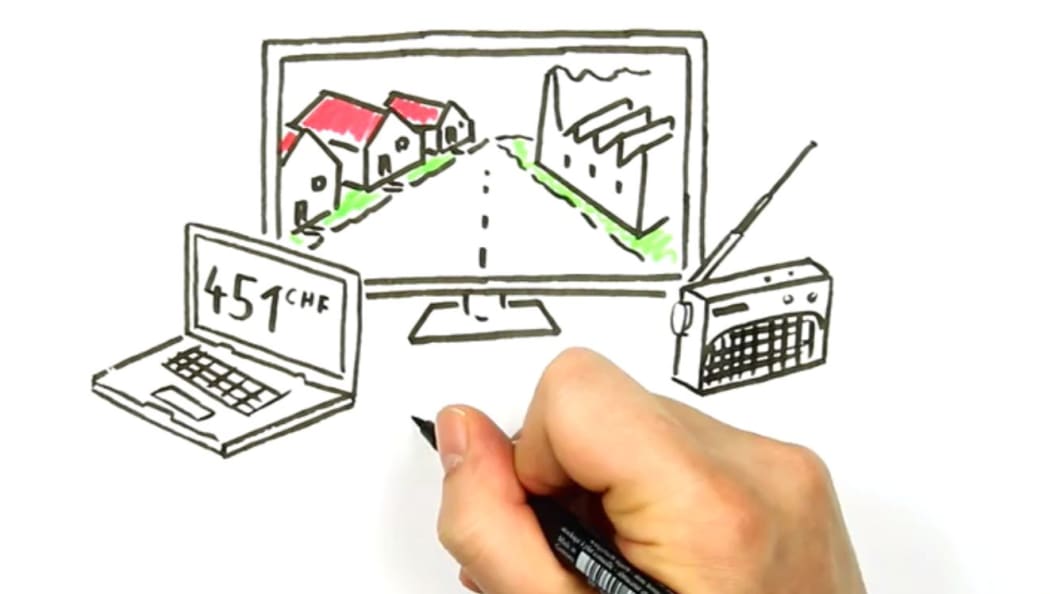While our government is promising to put more public money into public broadcasting, Switzerland is about to vote on whether to pull the plug on it altogther.

A still from an official video explaining the broadcasting referendum to Swiss voters. Photo: screenshot
'Direct democracy' is a big thing in Switzerland. Four times a year, the people are invited to vote on proposals put forward by citizens.
A referendum is being held today on a proposal to abolish the mandatory license fees paid by households in Switzerland for public service broadcasting - much like we used to pay here before the broadcasting reforms of the late 1980s. The fee accounts for 75% of the budget of Switzerland's public broadcaster SRG and it dominates the country's electronic media.
Supporters of the right-wing party SVP - backed by billionaire Christoph Blocher who also has media holdings - forced this vote by gathering the required 100,000 signatures last year.
If they get their way, Switzerland could become the first European nation to scrap licence fees in this way and other countries where public broadcasting is under review would take note.
The Swiss fee is known as Billag after the agency that collects it. Politicians, trade unions and arts organisations have been urging people to vote ‘no’ using the slogan No Billag, No Culture.
SRG also has a news website Swissinfo in 10 different languages to serve the one-in-four residents born in other countries and Swiss expats abroad.
Diccon Bewes is British-born resident of the city of Berne who is the vice-president of SwissInfo’s public council, the body that represents its audience and audits its performance.
He’s also the author of several books about Switzerland and the Swiss including the tongue-in-cheek Swiss Watching - Inside the Land of Milk and Money.

Diccon Bewes, author and member of SwissInfo's public council. Photo: supplied
"One of the strongest parts of the Swiss political system is that people themselves can decide on any issue. The Peoples Party (SVP) is the largest political party in the Swiss parliament and they got 29 percent of the vote in the last election - so it was quite easy for them to collect the required signatures," Diccon Bewes told Mediawatch.
"But there are 13 parties in the Swiss federal parliament. Only one is supporting this," he said.
The SVP regards the current fee as too high and a mandatory tax that can't be justified. Backers of No Billag say public broadcasting should be backed by sponsors and advertising instead.
"I think it's a smokescreen and they are trying to undermine public broadcasting because it has to be balanced and they don't like that," he said.
Currently the fee is set at 450 Swiss Francs a year (around $600 NZD) per household. It is due to drop to SF 365 - one Franc per day - next year.
But until then, 8.5 million Swiss people pay more per capita for their public broadcasting than anyone else except Norwegians. It's more than twice as much as British households pay for the BBC.
But Switzerland is unique. The SRG's radio stations, TV channels and online digital platforms must cater for four official langauges: German, French, Italian and Rhaeto-Romance, a language spoken mostly in the eastern Alps by around 50,000 people.
The Swiss certainly get a lot for their money.
Diccon Bewes says most major sports are offered free-to-air by SRG. There was "blanket coverage" of the recent Winter Olympics in South Korea.
"You get blockbuster films in English if you want, or you can watch them in German, French or Italian if you want to," he says.
Most major British and US hit TV shows have been screened by SRG for free, he says. In addition to comprehensive national news coverage, SRG has news bureaux in many places overseas.
How will the Swiss vote?
The latest polls show opponents of No Billag now outnumber its backers who appeared to lead opinion polls after the referendum was announced.
"It won't succeed. It is too extreme for most Swiss people and the middle ground wins most of these referendums," he said.
The result will be clear soon after midnight on Sunday (New Zealand time).

